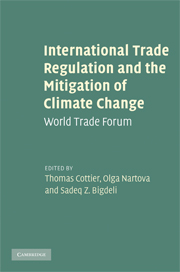Book contents
- Frontmatter
- Contents
- Contributors
- List of figures
- List of tables
- List of abbreviations
- Preface
- PART I Climate change mitigation: scientific, political and international and trade law perspectives
- PART II Climate change mitigation and trade in goods
- PART III Trade in renewable energy sources
- PART IV Climate change mitigation and trade in services
- PART V Climate change and technology transfer, investment and government procurement: legal issues
- 14 International transfer of technologies: recent developments in the climate change context
- 15 TRIMS and the Clean Development Mechanism — potential conflicts
- 16 Balancing investors' interests and global policy objectives in a carbon constrained world: the interface of international economic law with the Clean Development Mechanism
- 17 Procurement policies, Kyoto compliance and the WTO Agreement on Government Procurement: the case of the EU green electricity procurement and the PPMs debate
- 18 Procurement and the World Trade Organization: purchase power or pester power?
- PART VI Institutional challenges and the way forward
- Index
- References
18 - Procurement and the World Trade Organization: purchase power or pester power?
from PART V - Climate change and technology transfer, investment and government procurement: legal issues
Published online by Cambridge University Press: 04 August 2010
- Frontmatter
- Contents
- Contributors
- List of figures
- List of tables
- List of abbreviations
- Preface
- PART I Climate change mitigation: scientific, political and international and trade law perspectives
- PART II Climate change mitigation and trade in goods
- PART III Trade in renewable energy sources
- PART IV Climate change mitigation and trade in services
- PART V Climate change and technology transfer, investment and government procurement: legal issues
- 14 International transfer of technologies: recent developments in the climate change context
- 15 TRIMS and the Clean Development Mechanism — potential conflicts
- 16 Balancing investors' interests and global policy objectives in a carbon constrained world: the interface of international economic law with the Clean Development Mechanism
- 17 Procurement policies, Kyoto compliance and the WTO Agreement on Government Procurement: the case of the EU green electricity procurement and the PPMs debate
- 18 Procurement and the World Trade Organization: purchase power or pester power?
- PART VI Institutional challenges and the way forward
- Index
- References
Summary
Bringing government procurement within WTO disciplines has obvious benefits. Governments' purchase of goods and services in itself has considerable economic value. Moreover, in their purchase decisions, governments and authorities in general (mis)lead by example. Counting government, regional and local authorities as clients for one's business often amounts to a stamp of approval and helps foster sales to private clients. Government procurement is largely exempt from GATT and GATS disciplines. Interestingly, the original US draft for the Charter on the International Trade Organization (ITO Charter) would have made government procurement subject to most-favoured-nation and national treatment obligations. The London draft charter, however, deleted the relevant proviso from the text, ‘as it appears to the Preparatory Committee that an attempt to reach agreement on such a commitment would lead to exceptions almost as broad as the commitment itself’. Procurement is moreover not the only area where the ITO Charter (at draft or final stage) would have already incorporated the so-called ‘Singapore’ issues into the multilateral trading system long before the European Union (EU) in particular started its attempts to bring them within the remit of the WTO. With climate change concerns appearing on the horizon of most WTO Members (and firmly entrenched in some, including of course the EU), the scope for and use of so-called ‘green’ procurement has increased dramatically. This contribution will reflect on this development within the general context of the attempts at recruiting more WTO Members to the WTO Agreement on Government Procurement (GPA).
- Type
- Chapter
- Information
- International Trade Regulation and the Mitigation of Climate ChangeWorld Trade Forum, pp. 351 - 368Publisher: Cambridge University PressPrint publication year: 2009



